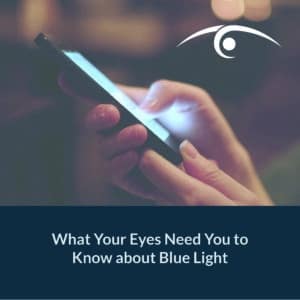 What is blue light? And how does it affect your eyes? If you think of the visible, white light we see as made up of all the colors in the rainbow, blue light has shorter wavelengths and more energy than warmer light. In general, the whiter the light appears, the higher amount of higher-wavelength blue light is entering your eyes.
What is blue light? And how does it affect your eyes? If you think of the visible, white light we see as made up of all the colors in the rainbow, blue light has shorter wavelengths and more energy than warmer light. In general, the whiter the light appears, the higher amount of higher-wavelength blue light is entering your eyes.
The largest source of blue light is sunlight. In addition, there are many other sources, including fluorescent and LED light, as well as the light emitted from computer monitors, smartphones, and tablet screens.
Almost all visible blue light passes through the cornea and lens and reaches the retina. The good news is that blue light is what helps you maintain a healthy circadian rhythm (your natural waking/sleeping cycle). It helps keep you alert, lifts your mood, and sharpens your thinking and memory. And kids need blue light for the healthy development of their eyes.
However, most of us get too much blue light from long hours on, and proximity to, our computer screens and digital devices. This could adversely affect vision and prematurely age the eyes. Early research shows that too much exposure to blue light could lead to:
Digital eyestrain: Blue light from computer screens and digital devices can decrease contrast, leading to digital eyestrain. Symptoms of eyestrain include sore or irritated eyes and difficulty focusing.
Retina damage: Studies suggest that continued exposure to blue light over time could lead to damaged retinal cells. This can cause vision problems like age-related macular degeneration. And, according to a recent study funded by the National Eye Institute, children’s eyes absorb more blue light than adults from digital device screens.
If constant exposure to blue light from smartphones, tablets, and computer screens is an issue, there are a few ways to decrease exposure to blue light:
Filters: Screen filters are available for smartphones, tablets, and computer screens.They shift the colors of your display to the warmer end of the spectrum, reducing the blue light that reaches your retina.
Computer glasses: Computer glasses with yellow-tinted lenses that block blue light can help ease computer digital eye strain by increasing contrast.
Anti-reflective lenses: Anti-reflective lenses reduce glare and increase contrast and also block blue light from the sun and digital devices.
Intraocular lens (IOL): Cataract surgery replaces the cloudy lens with an intraocular lens (IOL). These lenses can naturally protect your eye and retina from almost all ultraviolet light and some blue light.
Keeping your eyes healthy today will actually save on future healthcare costs. Call Takle Eye Group and talk to us about your options to protect your eyes from blue light. Our trained specialists can direct you toward the best eye protection for any activity.




